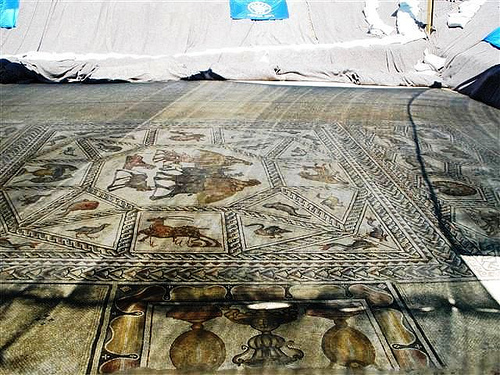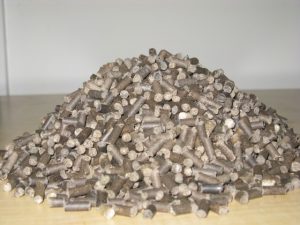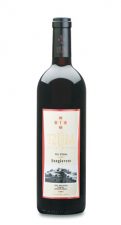 An ancient mosaic recently uncovered in the mixed city of Lod: Stigmatized as a crime infested, religiously divided city, residents of Lod have launched a grass-roots effort to change the face of the ancient city at the heart of Israel.
An ancient mosaic recently uncovered in the mixed city of Lod: Stigmatized as a crime infested, religiously divided city, residents of Lod have launched a grass-roots effort to change the face of the ancient city at the heart of Israel.
Mention Lod to anyone in Israel and more often than not it conjures up images of crime-infested slums, religious tensions and cultural backwardness.
Five minutes from Israel’s ultra-modern international airport is the city of Lod. Smack in the heart of the country, and rich in history, Lod has been Israel’s shameful backyard, the reference place for what Israelis didn’t want their cities to become, and a place most Israelis would never want to visit.
Today’s reality is not a rosy one. Lod has one of Israel’s poorest communities, with a sizeable high-school dropout rate and an enormous drug problem. The World Monument Fund recently included the city on its list of heritage sites, but its culture remains buried by neglect and decay. Indeed the municipality of the mixed Arab-Jewish city was found to be so corrupt and bankrupt that the government threw it out and imposed a former army general as acting mayor.
“We’ve got a terrible image and some of it is justified,” Lod resident Mira Marsiano tells The Media Line. “But a lot of good things are starting to happen in the city now.”
The community has been coming together to shed the stigma, launching a grass-roots campaign to transform the face of the city into a capital of multiculturalism and a new model of Jewish-Arab partnership.
Enter the Lod Community Foundation
The foundation aims to revamp the city, solve cultural disputes and put it back on the tourist map, beginning with a visitors’ center. It aims to get all the neighborhoods, in the city of 75,000 residents, to work together to clean up the urban space around them.
“People themselves began to believe they could do something,” says Ruth Lande Wasserman, a Lod resident. “Even though this may sound like a very improbable dream, these people sit in our own living room. We both live in the city, and they sit together, religious, nationalist, Jews, Muslims, and talk about how they will both create this visitors center.”
Wasserman, a former diplomat and adviser to President Shimon Peres, is one half of a dynamic young couple who have recently moved to Lod to organize the rebranding effort.
Her husband, attorney Aviv Wasserman, answered a personal appeal by the Mayor of Lod, Brigadier General (res.) Ilan Harai to help the city. “I saw Lod not as other people see it,” Wasserman says. “I didn’t see it as the capital of crime and drug dealing but as an opportunity, an opportunity to create the success story that the Middle East needs, that can show that Jews, Christians and Muslims can not only live together but can develop their city together.”
Using their political and cultural contacts, the Wassermans were able to garner support from across the country and energize the city’s residents to action. Renowned singer and activist David Broza was an early supporter.
“I didn’t just come here to sing,” Broza says. “I’m here helping the new foundation that has been created by the people of Lod without the interference of the mayor or the government or any political bodies here …We need time, all of us, the Arabs the Jews, everyone needs time to understand how to communicate with one another. This is the time to start applying what we know.”
Plans are underway to renovate an abandoned Turkish oil-press into a visitors’ center to attract more tourists. The foundation is helping establish a municipal kibbutz and student dormitories to attract idealistic young Israelis and affluent families to the city. Even empty car lots, often filled with rubble and rusted automobiles, are slated for development and forestation.
Lod has been settled continuously since the Stone Ages, making it over 8,000 years old. In ancient times Lod was a key road junction between Egypt and Babylon; nowadays it’s on the way between Tel Aviv and Jerusalem.
Nothing symbolizes Lod’s multi-cultural coexistence better than the Triangle of Peace. It is here that a church, synagogue and mosque actually share walls.
The World Monument Fund recently included Lod on its list of heritage sites. To mark the occasion, the city held an “open house,” inviting local business leaders, potential investors and international donors.
City youth, Arab and Jew, proudly escort visitors, showcasing the crown cultural attractions of the ancient city, including the church where St. George is buried, an ancient Mamluk mosque and a synagogue.
Nassiri Hasuna proudly welcomes some of the guests to his spacious home.
“There are problems in this city,” he bemoans. “There are outsiders. There are drug dealers and I can’t fight them. But the true Luddites don’t have any problems. We respect each other. We love the Jews and they love us.”
Sharing of ethnic dishes and musical entertainment capped the evening. This depressed city shared a proud moment for one night.
Minister of Minorities, Avishay Braverman, who blasted previous governments for neglecting Lod, promised that things would now be different.
“If we can work together,” he said, “we can create essentially a Holy Land which is holy for all, fertile for all and with justice for all.”
But in Marsiano’s eyes Lod has been the country’s proverbial drainpipe, collecting all the country’s cultural, criminal and religious refuse in one convenient location.
“We are the backyard of the state,” Marsiano says. “It seems that those higher up are actually kind of glad for all the worst woes of the country to be concentrated in one city. This has to change and I believe it will. My dream is that those on the outside will grasp our city for all of its benefits and help us really change. We are after all, the first thing you see when you arrive into the country.”
Located just 15 minutes from Tel Aviv, this ancient crossroad town has its work cut out for it but the residents are ready for action and hope that Lod will no longer be a place you just pass by – it will become a destination.
“We do have problems but we’ll overcome them,” says long-time resident Ze’ev Tzur. “Little by little, I believe that Lod will be an exemplary city in this country.”
(This story by Arieh O’Sullivan & Felice Friedson was reprinted courtesy of the The Media Line, the Mideast News Source.)
Image via zeevzeev




2 thoughts on “Rebranding Lod: from Modern Slum to Cultural Gem”
Comments are closed.